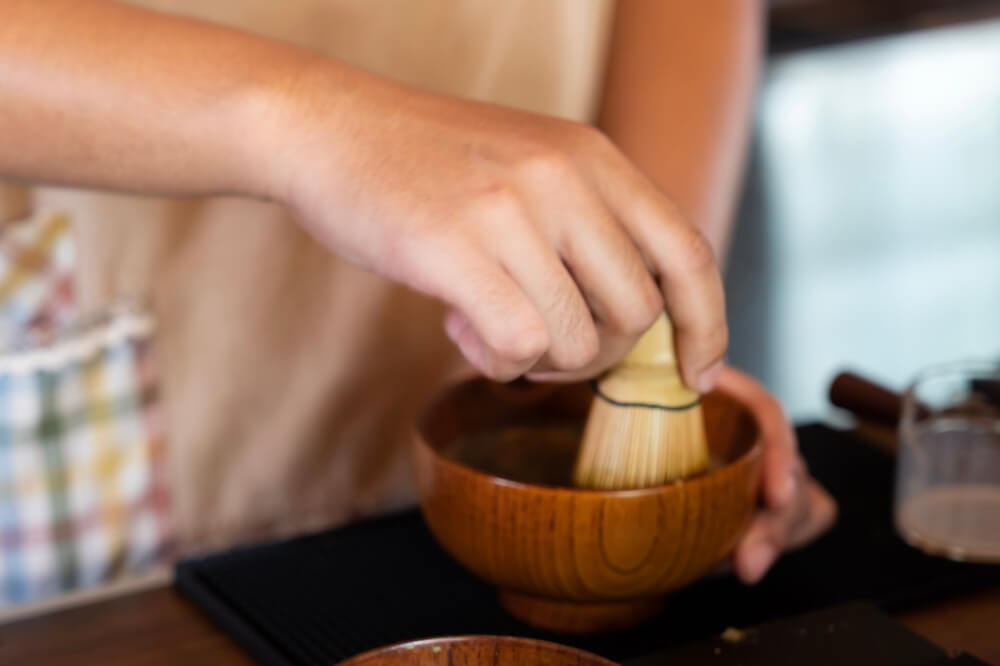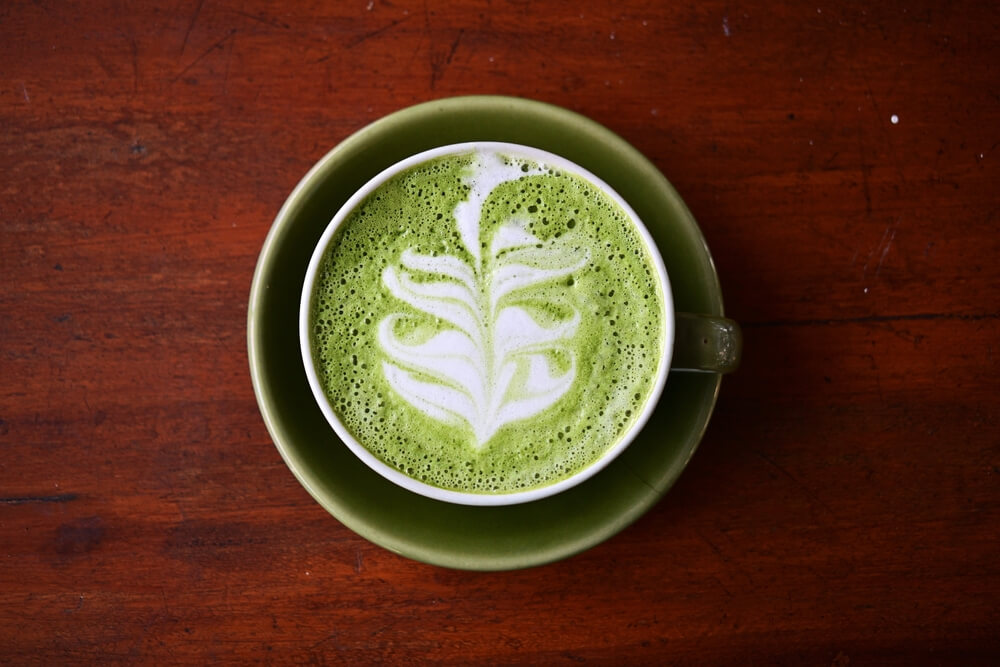Matcha, a finely ground powder from green tea leaves, is popular for its flavor and health benefits. Does it contain caffeine? Yes, matcha has more caffeine than most teas. This introduction explores matcha’s caffeine levels compared to other drinks, its health advantages, and how it delivers sustained energy. Whether you’re familiar with matcha or new to it, understanding these factors helps you decide how to include it in your routine.
The Caffeine Content in Matcha Compared to Other Teas and Coffee
When comparing the caffeine content in matcha to other teas and coffee, it’s essential to understand the unique properties of each beverage. Matcha, a powdered form of green tea, contains approximately 70 milligrams of caffeine per 8-ounce serving. This amount is higher than that found in regular green tea, which typically has around 28 milligrams per 8-ounce cup.
In contrast, a standard cup of coffee contains significantly more caffeine, about 95 milligrams per 8-ounce serving. Therefore, while matcha provides a substantial energy boost due to its moderate caffeine levels, it is still less potent than coffee.
However, what sets matcha apart from other caffeinated beverages is the presence of L-theanine. This amino acid promotes relaxation without drowsiness and works synergistically with caffeine to provide a calm yet alert state. Consequently, many people find that the energy from matcha feels smoother and more sustained compared to the often jittery rush associated with coffee.
When considering caffeinated teas as a whole, black tea generally has higher caffeine content than green tea but still falls short of coffee’s levels. An average cup of black tea contains about 47 milligrams of caffeine per 8 ounces.
If you’re looking for a balanced source of energy with additional health benefits, understanding how much caffeine is in matcha compared to other options can help you make an informed choice tailored to your needs.
Health Benefits of Caffeine in Matcha Tea

Matcha tea, a finely ground powder of specially grown and processed green tea leaves, is renowned for its numerous health benefits. One of the most compelling aspects of matcha is its caffeine content, which offers several advantages distinct from other caffeinated beverages.
Firstly, the benefits of caffeine in matcha are delivered in a more sustained manner compared to coffee. This is due to the presence of L-theanine, an amino acid that promotes relaxation without drowsiness. The combination of caffeine and L-theanine results in a calm yet focused energy boost from matcha, avoiding the jittery spikes and crashes often associated with coffee consumption.
Moreover, matcha health benefits extend beyond just an energy lift. Matcha is rich in antioxidants, particularly catechins like EGCG (epigallocatechin gallate), which have been linked to various health improvements such as enhanced metabolism and reduced risk of chronic diseases. These antioxidants in matcha help combat oxidative stress and inflammation in the body.
In addition to these advantages, regular consumption of matcha can support cognitive function due to its unique blend of nutrients. The synergy between caffeine and other compounds found in matcha can enhance memory, attention span, and overall mental clarity.
Incorporating matcha into your daily routine not only provides a gentle yet effective energy boost but also delivers substantial health benefits through its high antioxidant content and cognitive support properties.
The Unique Way Matcha Delivers Caffeine for Sustained Energy Levels
Matcha, a finely ground powder of specially grown and processed green tea leaves, offers a unique way to deliver caffeine for sustained energy levels. Unlike the rapid jolt often associated with coffee, matcha provides a more balanced and enduring source of energy. But how does matcha work to achieve this?
The secret lies in the combination of caffeine and an amino acid called L-theanine. While caffeine in matcha is responsible for the initial boost in alertness, L-theanine plays a crucial role in moderating this effect. L-theanine promotes relaxation without drowsiness, creating a state of calm focus. This synergy results in what many describe as “slow release caffeine.” Instead of experiencing sudden spikes and crashes, you enjoy sustained energy from matcha over several hours.
This slow release mechanism makes matcha an excellent choice for those seeking consistent productivity throughout the day without the jittery side effects commonly linked to other caffeinated beverages. Whether you’re navigating through back-to-back meetings or engaging in creative projects, incorporating matcha into your routine can help maintain steady energy levels and enhance overall well-being.
How to Prepare Matcha for Optimal Energy and Health Benefits
Matcha, a finely ground powder of specially grown and processed green tea leaves, has gained popularity for its numerous health benefits and energy-boosting properties. Preparing matcha tea can be an art in itself, with traditional and modern methods offering different experiences.
To prepare matcha traditionally, start by sifting 1-2 teaspoons of matcha powder into a bowl to avoid clumps. Add a small amount of hot water (not boiling, ideally around 175°F or 80°C) and use a bamboo whisk (chasen) to mix the powder into a smooth paste. Gradually add more hot water while whisking in a zigzag motion until you achieve a frothy consistency.
For those who prefer modern methods, using an electric frother or blender can be just as effective. Simply combine the sifted matcha powder with hot water in your device and blend until smooth and frothy.
Both traditional and modern methods have their merits. The traditional approach offers a meditative experience that connects you with centuries-old Japanese tea ceremonies, while modern techniques provide convenience for those on the go. Regardless of your chosen method, preparing matcha correctly ensures you reap its full energy-boosting and health benefits.
Should You Avoid or Embrace Matcha?
For individuals with sensitivity to caffeine, the decision to consume caffeinated beverages can be fraught with uncertainty. One popular option that often comes under scrutiny is matcha, a powdered form of green tea known for its rich flavor and numerous health benefits. Understanding the nuances of caffeine sensitivity in green tea can help you make an informed choice.
Matcha contains a moderate amount of caffeine compared to other caffeinated teas and coffee. However, it also includes L-theanine, an amino acid that promotes relaxation without drowsiness. This unique combination may offer a more balanced energy boost, potentially mitigating some of the jittery effects commonly associated with caffeine consumption.
If you have sensitivity to caffeine but still wish to enjoy caffeinated teas like matcha, moderation is key. Start with smaller servings and observe how your body reacts. Additionally, consider consuming matcha earlier in the day to avoid any potential interference with your sleep patterns.
Whether you should drink caffeinated teas with sensitivity depends on your individual tolerance levels and how your body responds. Consulting a healthcare professional can provide personalized guidance tailored to your specific needs.
Is Match a Good Choice for Your Daily Caffeine Fix?
When considering whether matcha is a good choice for your daily caffeine fix, it’s essential to weigh its unique benefits and potential drawbacks. Unlike traditional coffee, matcha provides a more sustained energy boost without the jittery side effects often associated with high caffeine intake. This is primarily due to the presence of L-theanine, an amino acid that promotes relaxation and enhances focus.
Matcha also boasts a rich profile of antioxidants, particularly catechins like EGCG (epigallocatechin gallate), which have been linked to various health benefits including improved metabolism and reduced risk of chronic diseases. Additionally, the ritualistic aspect of preparing matcha can add a mindful moment to your morning routine, fostering a sense of calm and purpose.
However, matcha does contain caffeine, although in smaller amounts than coffee, so it’s important to consume it in moderation. For those who are sensitive to caffeine or who experience side effects from it, it may be advisable to start with a smaller amount.
In summary, if you’re seeking an alternative to coffee that offers both mental clarity and health benefits, matcha could indeed be an excellent addition to your daily regimen. Its balanced energy release and nutritional advantages make it a compelling choice for anyone looking to enhance their daily routine with a touch of zen-like tranquility.






